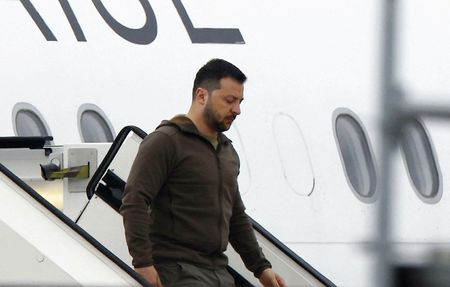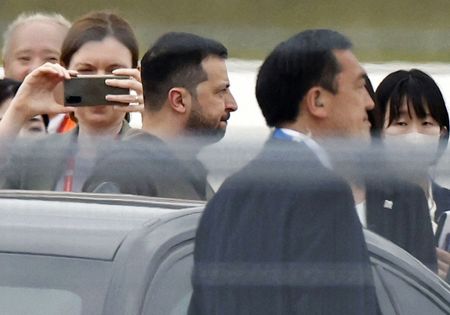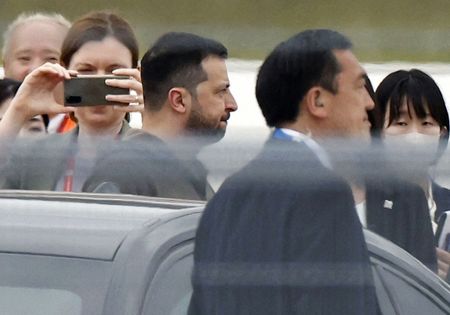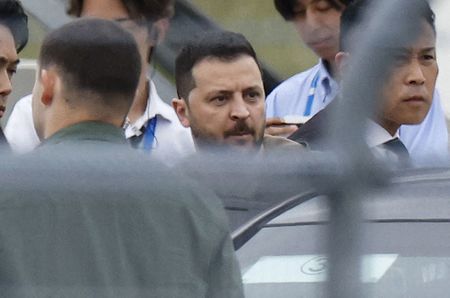



By John Irish and Sakura Murakami
HIROSHIMA, Japan (Reuters) -Ukraine’s Volodymyr Zelenskiy brought his call for support against Russia’s invasion to a Group of Seven (G7) summit on Saturday to Japan, where leaders agreed to tighten sanctions against Moscow and pare back exposure to China.
The Ukrainian president’s attendance at the G7 summit in Hiroshima, the first city to suffer a nuclear attack, put in sharp relief western concerns over the nuclear threat posed by Russia.
Leaders of the G7 – the U.S., Japan, Germany, Britain, France, Italy and Canada – are grappling with the challenges posed by Russia’s invasion of Ukraine and tensions with China, notably over economic security and Taiwan, the self-ruled island Beijing claims as its own.
Worried by the outsized role China now plays in supply chains for everything from semiconductors to critical minerals, the G7 issued a communique that set out a common strategy towards future dealings with the world’s second-largest economy.
“We call on China to press Russia to stop its military aggression, and immediately, completely and unconditionally withdraw its troops from Ukraine,” the leaders said in a statement.
They warned that countries attempting to use trade as a weapon would face “consequences”, sending a strong signal to Beijing over practices Washington says amount to economic bullying.
“We are not decoupling or turning inwards. At the same time, we recognise that economic resilience requires de-risking and diversifying,” they said. “A growing China that plays by international rules would be of global interest.”
‘MEETINGS WITH FRIENDS’
The communique was issued shortly after Zelenskiy touched down in a French government aircraft.
Footage from Japanese public broadcaster NHK showed the Ukrainian president, wearing his customary olive green fatigues, stepping down to the tarmac and moving quickly to a waiting car.
Moments later he tweeted: “Japan. G7. Important meetings with partners and friends of Ukraine.”
Zelenskiy was set to meet the leaders of the G7 individually throughout Saturday evening. He began with Italian Prime Minister Giorgia Meloni, followed by Britain’s Rishi Sunak, whom he hugged upon greeting.
French and other European officials said it was crucial that Zelenskiy came in person first to the Arab League, which he addressed on Friday, and now to the G7, also being attended by members of the Global South, a term for some mostly low- and middle-income nations, including India.
Zelenskiy could outline Ukraine’s view as the victim of an attack by Russia and how he saw a peace settlement in the future to the disparate groups, the officials said.
“We have to use all the means to bind non-aligned states to the cause of the defence of the sovereignty and territorial integrity of Ukraine,” a French presidential official told reporters.
As well as bilateral meetings with G7 leaders, Zelenskiy will also meet the leaders of India and Brazil, two countries that have not distanced themselves from Moscow. With Russia and China they form the BRIC grouping.
Zelenskiy is due to hold a session on Sunday with the G7 before a broader session with the Global South attendees.
(Reporting by Katya Golubkova and John Irish, Jeff Mason, Sakura Murakami, Andreas Rinke, Kentaro Sugiyama and Trevor Hunnicutt in Hiroshima; Kantaro Komiya and Chang-Ran Kim in Tokyo; Writing by David Dolan; Editing by Nick Macfie, William Mallard and Simon Cameron-Moore)
